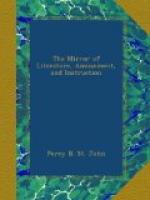The colonel also knew something of Churchill, described him as by no means prepossessing in person, and one of the last who could have been supposed capable of writing as he wrote. The colonel, in his old age, imagined he too had a taste for poetry, and boasted of Goldsmith’s having asserted (perhaps jokingly) that he possessed a talent for writing verse. This idea working in his mind for years, had induced him to print, in his old age, what he called, to the best of my recollection, “A Continuation of the Deserted Village.” He always brought a copy with him of an evening, and was fond of referring to it, and passing it round for the company to look at—a weakness pardonable in a garrulous old man. On revisiting the house, for old acquaintance sake, after an absence of some years from London, I missed him from his accustomed place, which I observed to be occupied by a stranger. On inquiry, I found that he was departed to where human vanity and human wisdom are upon a level, and where man is alike deaf to the voice of literary and military ambition.—New Monthly Magazine.
* * * * *
NOTES OF A READER.
* * * * *
THE ANNUALS FOR 1830.
We feel it a duty to the proprietors of these elegant works, as well as to our readers, to give the following annonces of the several volumes for 1830:—
The Keepsake is very forward. Among the contributors are Sir Walter Scott, Lord Byron, and the author of “Anastasius.” Sir Walter’s contribution is a dramatic romance, in imitation of the German; and Lord Byron’s are ten letters written by him between 1821, and the time of his lordship’s death.
The Forget-Me-Not will contain a very gem—being the first known attempt at poetry, by Lord Byron, copied from the autograph of the noble poet, and certified by the lady to whom it was addressed—the object of his lordship’s first, if not his only real attachment.




